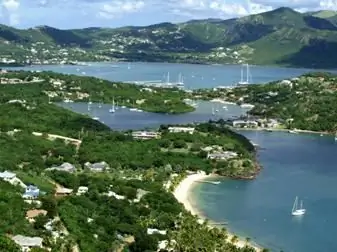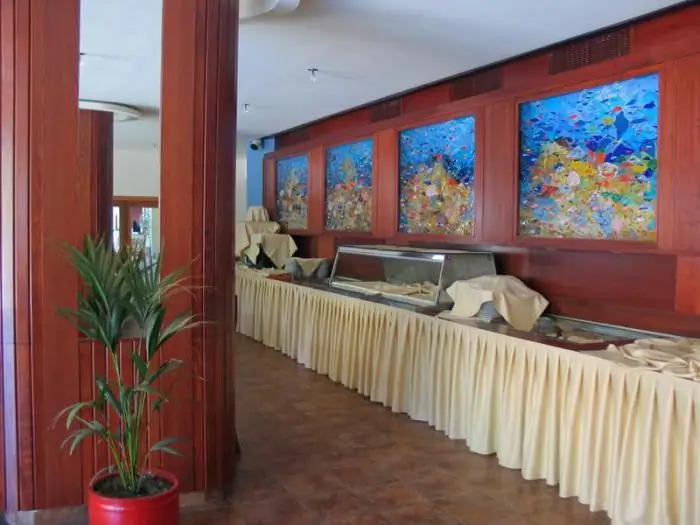- Author Harold Hamphrey hamphrey@travelwaiting.com.
- Public 2023-12-17 10:06.
- Last modified 2025-01-24 11:10.
It should be said that there are several geographical points in the world called the "Golden Horn". And there are even two bays with the same name. One of them is in our country. It is located in the Primorsky Territory and divides the city of Vladivostok into two halves. And then there is Zlatni Rat - a beach on the Croatian island of Brac. A huge, almost six hundred meters long, sandy spit near the town of Bole is located exactly opposite the Makarska Riviera. This Golden Horn is one of the "visiting cards" of tourist Croatia. The Belarusian analogue is little known even to the inhabitants of this country. After all, Zalati Rog is a small village of the Khalchansky village council of the Vetka district of the Gomel region. But here we will talk about the bay, which is on everyone's lips. This is Chrysokeras, which in Greek means "Golden Horn". And also about his Far Eastern namesake.

The We alth of Istanbul
This curved bay in the form of a deer antler with numerous branches traces the European part of the Turkish city and divides it into southern and northern halves. A ride on a pleasure steamer along the Golden Horn is item number 1 on the list of “Whatto do to a tourist in Istanbul”. Since the shores of the bay cut deep into the historical part of the city, very picturesque photos can be taken from the ship. The Golden Horn Bay on Turkish maps bears the modest name Halich, which means simply “bay” in translation. But do not underestimate the romantic Turkish soul. Haliç is for short. And the full name of the bay is Halich-i-Dersaadet, "The Bay of the Gates of Bliss." No more and no less. Indeed, on the high bank stands the Sultan's Topkapi Palace. God knows what bliss was promised to its owner by the houris who lived in the local harem.

Gulf Formation
Golden Horn Bay was created by a sudden shift in the plates of the lithosphere relatively recently - only eight thousand years ago. The shores of the Sea of Marmara were already inhabited by people. As a result of the displacement of the plates, the Bosphorus was also formed. The s alty waves of the Mediterranean Sea poured into the Black Sea. This not only increased the level of the last reservoir, but almost all the fish died out. After all, the Black Sea for a long time had no connection with the World Ocean and was fresh. There is an opinion that the poisonous hydrocarbon layer accumulated at the bottom is nothing but the remains of the cadaveric decomposition of the former fauna of this water area. But the crack that formed the Bosphorus deepened into the European part of present-day Istanbul. This is how the bay, called Chrysokeras by the Greeks, appeared.

What kind of gold does the Horn hold?
Even the ancient geographer and historian Strabo noted that due to currents a lot of fish enter the Golden Horn. He writes that incertain seasons it could be caught even with bare hands. However, he designates the bay itself as the “Horn of Byzantium”. In addition to the fame of a fishing place, the bay has earned a reputation as a convenient harbor for the fleet. Even serious storms have little effect on the calm surface of the bay. Therefore, Emperor Constantine, after whom the city was named, ordered the construction of shipyards here. It is also hard to overestimate the transport significance of the bay. The shores of the Greek Chrysokeras were inhabited by merchants. So that large merchant ships could also enter the bay, in the 16th century Alexandra Anastasia Lisowska, better known to the world as Roksolana, ordered to deepen the bottom of the Golden Horn. Modern Turks also recognize the importance of this waterway. Therefore, along with the name "Gate of Bliss" one can often hear Altin Boynuz - the Golden Horn.
What does the natural harbor look like now?
Earlier, settlements of Jewish and Armenian merchants stretched along the shores of the Golden Horn. For some time there was even a colony of the Republic of Genoa here. But during the time of Constantinople, at the ends of the Golden Horn, in the Greek region of Blachernae, the palaces of the emperor and all the Byzantine nobility were located. During late antiquity, the coastal region was called Galata. It was to the local Christians that one of the Epistles of the Apostle Paul was addressed. Now the ship sails past ancient mosques, the Galatian Tower, museums and landscaped parks. The length of the bay is more than twelve kilometers, and the width is small - only one hundred meters. This allows you to see all the sights along the banks. They are connected by four bridges: Old and New Galata,Halic and Ataturk.

Golden Horn Bay, Vladivostok: a glimpse of glory
The world-famous Turkish harbor gave its name to the bay, located many thousands of kilometers east of it. Even during the Crimean War, a small Chinese village existed in the Primorsky Territory, the inhabitants of which were engaged in the extraction of seafood, fish and the cultivation of vegetables. They themselves called their bay Haishenwei, "the bay of the golden trepang." The British, who arrived here, renamed the water area Port May, after the name of the captain of the ship. In 1852, when the territory became part of the Russian Empire, the bay was named after Peter the Great. But this name did not stick. Seven years later, Governor-General N. Muravyov-Amursky saw in the winding shores of the bay a resemblance to the Istanbul harbor. Therefore, he renamed the former Haishenwei into the Golden Horn. And on the shores of the bay, he founded the military fort of Vladivostok, which later turned into a city.






